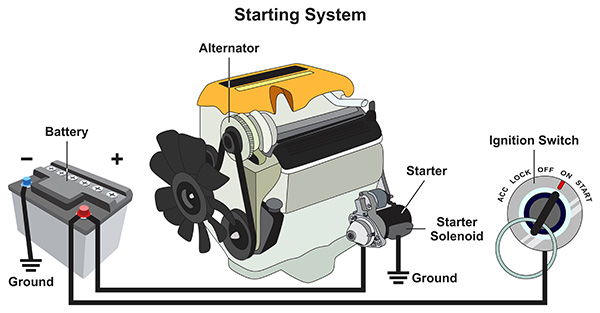
Cars have become increasingly dependent on complex electrical systems, making them more advanced but also more prone to electrical issues. While engines and brakes used to dominate car repair concerns, today's car owners often deal with various electrical problems. From faulty batteries to malfunctioning sensors, electrical issues can be frustrating and, at times, hard to diagnose. The key is to recognize and address the signs early before they become bigger, costlier problems. So, what are car owners' most common electrical issues, and how can you stay ahead of them?
Dead or Failing Battery
If your car won’t start or the electronics are flickering, the culprit is often a dead or failing battery. Your car’s battery is the heart of its electrical system, providing the power needed to start the engine and operate all electrical components. Over time, batteries naturally degrade, losing their ability to hold a charge. Extreme weather, leaving lights on, or not driving for extended periods can also drain the battery more quickly.
When your battery starts to fail, you may notice dimming headlights, slow engine turnover, or dashboard lights that flicker or won’t come on at all. Replacing a car battery is a simple fix, but ignoring the early signs could leave you stranded at the worst possible moment.
Faulty Alternator
While the battery provides the initial power, the alternator is what keeps your car running once the engine starts. It charges the battery and powers all electrical systems while you drive. If your alternator is failing, your car’s electrical system may begin to malfunction even while the engine is running. You might experience dimming lights, slow window operation, or even stalling.
A bad alternator often gives off warning signs such as strange sounds, dashboard warning lights, or electrical components acting erratically. If left unchecked, a failing alternator can drain the battery completely, leaving you unable to start the car.
Malfunctioning Starter Motor
The starter motor is responsible for turning over the engine when you start your car. If the starter is malfunctioning, your engine won’t crank, leaving you unable to drive. Symptoms of a bad starter include a clicking noise when you turn the key or a grinding noise that signals the starter is trying but failing to engage.
If your car refuses to start despite a healthy battery, the starter is often the next component to check. While this is a more involved repair, catching a starter issue early can prevent you from getting stranded.
Blown Fuses
Fuses are designed to protect your car’s electrical system from short circuits and electrical overloads. When a fuse blows, it cuts off power to the affected system, which could range from your car’s lights to its radio or even critical engine components. Common causes of blown fuses include overloading a circuit or a short in the wiring.
If a single electrical system stops working, checking the fuses should be your first step. Fuse replacement is generally straightforward and inexpensive, but frequent blown fuses may indicate a deeper electrical issue that needs professional attention.
Wiring Issues
Modern vehicles contain miles of wiring that connect various electrical components. Over time, these wires can become damaged due to corrosion, exposure to the elements, or simply wear and tear. Wiring issues can cause unpredictable electrical failures, from malfunctioning lights to erratic engine behavior.
Wiring issues are notoriously tricky to diagnose because they often result in intermittent problems. If you’re experiencing electrical gremlins that come and go without explanation, there’s a good chance it’s a wiring issue. Properly diagnosing and repairing wiring problems usually requires a professional with specialized tools.
Failed Sensors
Modern cars rely on an array of sensors to monitor everything from engine performance to tire pressure. These sensors send data to the car’s computer, which makes adjustments to keep the car running smoothly. When a sensor fails, it can trigger warning lights on the dashboard or cause the car to operate inefficiently.
Common sensor failures include the oxygen sensor, which monitors exhaust gasses, and the mass air flow sensor, which ensures the correct fuel-to-air ratio. If your car’s check engine light is on, there’s a good chance a sensor has failed. While some sensors are simple to replace, others require more involved repairs, so getting a proper diagnosis is important.
Experiencing flickering lights or a car that won’t start? These are signs of electrical issues you shouldn’t ignore. At Funk Bros Auto, our skilled technicians can quickly identify and fix the problem, keeping your car safe and reliable. Contact us now to book an inspection!